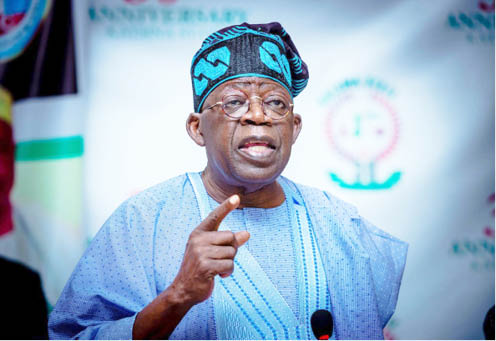Asiwaju and the burden of APC!
Under normal circumstances, the candidate of a ruling party should easily be the favourite to win a presidential election. The problem for Asiwaju Bola Ahmed Tinubu, candidate of the ruling All Progressives Congress (APC), is that these are not normal times and he is being blamed for foisting a failed government on the nation. In […]

Under normal circumstances, the candidate of a ruling party should easily be the favourite to win a presidential election. The problem for Asiwaju Bola Ahmed Tinubu, candidate of the ruling All Progressives Congress (APC), is that these are not normal times and he is being blamed for foisting a failed government on the nation.
In order to resolve this anomaly, he continuously de-markets his political party and makes it quite clear that had he been in charge, things would have been very different.
The voting majority doesn’t want a continuation of the APC’s legacy of economic failure, insecurity, failed anti-corruption war and mismanagement of ethnic and religious diversities, and it comes as no surprise that in his determination to win the election, Asiwaju is openly criticising Buhari’s government. He desperately needs to obliterate the role he played in bringing such affliction on Nigerians, and is better off standing on his own record in state governance, rather than that of the APC at national level.
In truth, practically everything the APC claimed to represent has turned out to be pretence. The paradox of Asiwaju’s presidential ambition is that he is standing on the ticket of a political party, which has performed abysmally. Formed by a marriage of convenience between strange bedfellows, their personal ambitions were more important than political principles. It’s not normal for political parties to be formed for the sole purpose of actualising personal ambitions, but this was the case with the APC, and under this arrangement, Asiwaju asserts that it’s his “turn” to be president.
To give him due credit, unlike the other major candidates, Asiwaju has not jumped from one political party to another in search of the presidency. While both he and the APC have their own share of problems, so do the other leading parties and their candidates.
The Peoples Democratic Party’s (PDP) candidate is burdened by the fact that while rotation of power between the North and South isn’t a constitutional requirement, it’s one of the “political palliatives”, which has bandaged our democracy together. The Labour Party candidate is hampered by the fact that his chosen political vehicle has no real party structure, and without several governors, senators, or members of the House of Representatives in the party, it will be difficult for him to govern. This is especially relevant now that the courts are actively restraining elected political office holders from carpet crossing while in office.
Perhaps, the one personal characteristic, which distinguishes Asiwaju from the other major contenders is his inarticulate speech. His detractors have made much of this ineloquence, however it is trite that what is important in life is what a person says, not how he says it. Although his detractors have cast aspersions on Asiwaju’s personal integrity, discipline, knowledge, and leadership ability, such character rubbishing, which has been described as a “substance free, mendacious, tendentious and unthinking insult fest” is not what will determine the outcome of the election.
It’s no surprise that the manifestoes of the leading candidates are essentially the same. The nation’s priority problems requiring immediate solutions are well known, and deciding the 2023 election winner should be about the candidates’ moral compass and values found in his character.
Even his enemies agree that while Asiwaju disdains those he does not love, he has a large heart for those he does. This is a problem he will need to overcome. Generous people habitually surround themselves with praise singers and sycophants who don’t tell them the truth, feed their egos and support them simply for their own personal gain. Many of his closest supporters are simply clinging to a ship, which looks as if it is sailing towards a decent destination.
As with all the other presidential candidates, Asiwaju is promising heaven on earth by mistakenly arrogating to himself absolute power. It is trite that development is not necessarily an outcome of political promises, but of vision complemented with action. His promise to continue the legacy of Buhari is hollow and incapable of igniting social change. The irony for Asiwaju is that his political party the APC is part and parcel of the problems he wants to solve! It is a political party, which has proved that its sole aim is to hijack the instruments of state power for their personal benefit.
Many of the criticisms of Asiwaju’s refusal to adopt a “know-all” attitude are unjustified. Nigerians suffer from an outdated concept of leadership in which “rulership” is more important than collective leadership or active citizenship in determining government policies and actions. When Asiwaju said that no matter how much citizens complain, he will remove fuel subsidy if elected, it was an extremely ineloquent way of stating that he is committed to a certain policy and portrayed him as someone who needs to convince voters that he will listen and take other opinions into consideration. Although Asiwaju has accused the Buhari administration of using fuel scarcity and new Naira notes to hinder his electoral victory, there is a widespread belief that President Buhari will want to see his party retain power otherwise it will be a tacit admission of his failure in governance. Everyone learns to live with his or her conscience and the biggest burden Asiwaju will have to overcome isn’t a moral one, but rather that of being a candidate for the APC.
